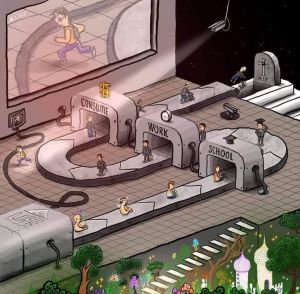The System
The System: A Web of Interconnected Constructs Ensnaring Humanity
"The System" is a complex network of interconnected constructs that includes government institutions, law enforcement agencies, educational systems, financial institutions, and various other mechanisms of control. It functions as a web, entrapping individuals in a perpetual cycle of obligations and responsibilities. From education to employment, credit cards to insurance, this system exerts its influence through the manipulation of numbers and societal norms, shaping the lives of individuals and dictating their choices.
The Education System: A Pathway into the Cycle
One of the fundamental components of "The System" is the education system. While education plays a crucial role in personal development and the acquisition of knowledge, it has also become a mechanism for channeling individuals into the cycle. Graduates find themselves burdened with student loans, which necessitate immediate employment to meet financial obligations. The pursuit of higher education, initially seen as a gateway to success, becomes a catalyst for lifelong debt and dependency.
The Workforce and Financial Entanglements:
"The System" thrives on the notion that individuals must become productive members of society, seeking employment to sustain themselves and contribute to the economy. However, this often leads to a state of perpetual obligation. Many find themselves trapped in jobs they dislike, merely to meet financial demands imposed by the system. Credit cards and loans, further entangling individuals in a web of debt, become tools used to keep them compliant. Meanwhile the system may give you a favor if you stayed in the system for after a while (10 Years+) due to increased financial responsibility, the System will try to also try to kick the elders out and give it to the Social Security section of the System.
Insurance and the Necessity of Risk Management:
In an increasingly complex world, insurance becomes a requirement for various aspects of life. Whether it is health insurance, car insurance, or home insurance, individuals are compelled to participate in risk management schemes. While insurance offers protection, it also perpetuates the cycle by imposing financial obligations that must be met without fail. Failure to comply can lead to dire consequences, further cementing individuals' reliance on "The System."
The 24/7 Cycle and Escaping its Grasp:
"The System" is designed by the New World Order to maintain a constant state of productivity and consumption, leaving individuals with little time for personal pursuits or genuine self-expression. The demand for constant availability perpetuates the cycle, leaving individuals physically and mentally exhausted. Escaping its grasp becomes a daunting task, as the system thrives on ensuring compliance and the perpetuation of societal norms.
Conclusion:
"The System" represents a web of interconnected constructs that exert control over individuals' lives. From education to employment, financial entanglements to societal expectations, it ensnares individuals in a cycle that offers little respite or room for personal growth. Breaking free from its grasp requires a critical examination of these constructs, a reevaluation of societal norms, and a collective effort to reshape the systems that govern our lives. Only then can we hope to achieve true freedom and reclaim our individuality in the face of "The System's" all-encompassing reach of The Algorithm of the Internet...
American Dream
The Illusion of the American Dream: Commercialization of Time and the Perils of Working for Comfort
The concept of the American Dream has long been ingrained in the collective consciousness, with its promise of boundless opportunities and upward mobility. The iconic image of the Statue of Liberty represents the belief that hard work alone can pave the way to a life of prosperity and fulfillment. However, a closer examination reveals a stark contrast between this idealized vision and the realities faced by many Americans today.
Stagnating wages, the decline of labor unions, and ever-widening wealth inequality have shattered the notion of the American Dream as an attainable goal for all. In fact, the United States ranks poorly in terms of social mobility compared to other developed nations, including those often labeled as more socialist. Born into poverty in America, individuals face significant obstacles in transcending their circumstances and achieving upward social mobility.
Sadly, the American Dream seems to hold greater promise elsewhere, as the US currently boasts the highest poverty rate among wealthy nations. The staggering levels of wealth inequality in the country, comparable to those found in third-world nations, contribute to the erosion of social mobility and further perpetuate the cycle of poverty.
This dream, which hinges on the belief that hard work guarantees success, oversimplifies the complex factors that influence an individual's trajectory. It perpetuates the stereotypes that the wealthy are solely the result of their industriousness, while the poor are labeled as lazy and lacking motivation. This simplistic narrative fuels systems that marginalize the working class and disproportionately reward the top 1% of society.
Supply-side economics, often referred to as "trickle-down" economics, exemplifies one such policy that perpetuates income inequality. Advocates argue that tax cuts for the wealthy will stimulate job creation and benefit society as a whole. However, the reality is that these tax cuts primarily benefit the wealthiest individuals, without proportionate investments in the workforce or increased consumer spending.
The consequences of extreme income inequality extend far beyond the obvious detrimental impact on the quality of life for the majority of citizens. It distorts the economy, leading to inefficiencies and hindering democratic processes and policies. The influence that the wealthiest wield over politics, through massive campaign donations and lobbying efforts, skews policymaking in favor of their interests, perpetuating the vicious cycle of increasing inequality.
This concentration of wealth and power also undermines the middle class, which serves as the backbone of a thriving economy. The resulting destabilization creates a self-perpetuating cycle of low income, reduced consumption, and downsizing, further exacerbating the growing income divide.
It is evident that low levels of inequality benefit all members of society, regardless of their socioeconomic status. The inherent worth of individuals should not be determined by their wealth, yet current economic policies and societal structures perpetuate this misguided narrative. We idolize the rich and stigmatize those experiencing poverty and homelessness, fostering a culture that associates wealth with inherent value.
The American Dream, ultimately, remains an elusive fantasy. While a select few may rise from poverty to great wealth, the widespread belief in equal opportunity and upward mobility is flawed. Pretending that such opportunities exist only contributes to the dehumanization and disenfranchisement of American citizens.
The real change requires dismantling the systems that perpetuate income inequality and challenging the narrative that equates wealth with worth. Only then can we strive for a society that offers genuine opportunities for all its citizens, unburdened by the illusory promise of the American Dream.

